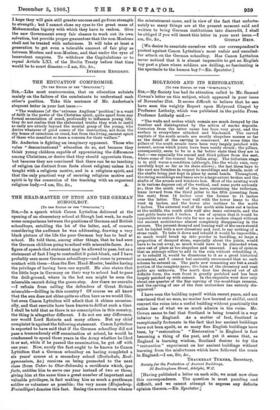THE HEAD-MASTER OF ETON AND THE GERMAN SCHOOLBOY.
[To THE EDITOR OF THE "SPECTATOR."' SIR,—In a speech which Canon Lyttelton delivered at the opening of an elementary school at Slough last week, he made some comparisons between the positions of German and British schoolboys, extolling the lot of the latter, and, of course, considering the audience he was addressing, drawing a very black picture of the life the poor German boy has to lead at school. He told them, among other things, that he had seen the German children going to school with miserable faces. As a figure of speech that statement may be allowed to pass, but as a statement of fact I beg to contradict it point-blank, and I have probably seen more German schoolboys—and come in personal contact with them—than the Rev. Head-Master, besides having the privilege of having been one myself. He also states that the little boys in Germany on their way to school had to pass the drill-ground, where in the hot sun might be seen the miserable recruit doing the goose-step. Are there no recruits —I refrain from calling the defenders of Great Britain miserable—drilling in this country ? Of course we all know that the sun does not shine quite so often here as we would like, but even Canon Lyttelton will admit that it shines occasion- ally, and that recruits have been known to drill at such a time. I shall be told that as there is no conscription in this country, the thing is altogether different. I do not see any difference, nor would Lord Roberts and many others. But my chief complaint is against the following statement. Canon Lyttelton is reported to have said that if the German schoolboy did not pass a tremendously stiff examination at school, be would be condemned to spend three years in the Army whether be liked it or not, while if he passed the examination, he got off with one year. Now, surely the fact ought to be known to Canon Lyttelton that a German schoolboy on having completed a six years' course at a secondary school (Realschule, Real- gymnasium, &c.) receives on being promoted to the next class (from Unter- to Ober-Sekunda) a certificate which, ipso facto, entitles him to serve one year instead of two or three, giving him at the same time a great number of important and valuable privileges, in fact making him as much a gentleman soldier or volunteer as possible; the very name (Einjaehrig- Freiwilliger) denotes this fact Seeing the source from whence
the misstatement came, and in view of the fact that unfortu- nately so many things are at the present moment said and written to bring German institutions into discredit, I shall be obliged if you will insert this letter in your next issue.—I [We desire to associate ourselves with our correspondent's protest against Canon Lyttelton's most unfair and uncalled- for attack on the German schoolboy. Has Canon Lyttelton never noticed that it is almost impossible to get an English boy past a place where soldiers are drilling, so fascinating is the spectacle to the human boy P—En. Spectator.]






































































 Previous page
Previous page